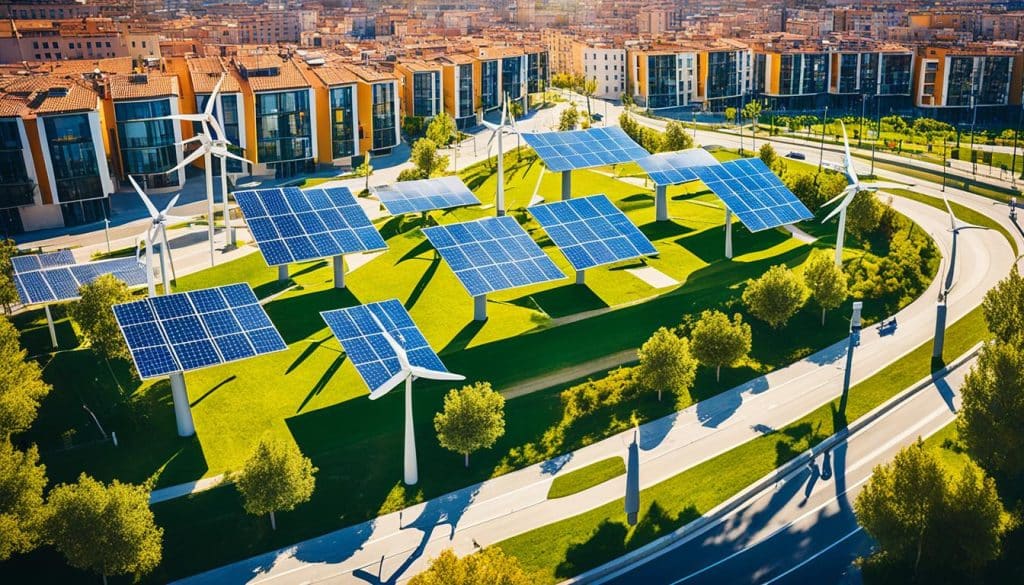Spain is at the forefront of renewable energy in Europe, thanks to its sunny and windy weather. It aims to produce most of its electricity from renewables by 2030. This ambition highlights Spain’s dedication to green power.
The United Nations Environment Programme (UNEP) backs Spain’s green efforts. It offers advice and money solutions for eco-friendly energy. Spain’s energy market appeals to many investors, each with different interests.
Yet, investing in renewable energy does come with some risks. These include changes in laws and market ups and downs. But the future looks bright. Spain’s commitment and worldwide climate initiatives suggest renewable energy will keep growing.
Key Takeaways:
- Spain is a leader in the renewable energy sector within Europe.
- The country’s natural advantages, such as abundant sunshine and strong winds, contribute to its high levels of renewable energy production.
- The United Nations Environment Programme (UNEP) supports Spain’s renewable energy initiatives.
- The renewable energy market in Spain provides diverse investment vehicles.
- Investors need to carefully evaluate the risks associated with renewable energy investments.
Spain’s Natural Advantages for Renewable Energy
Spain’s location gives it special benefits for making green energy. It has lots of sunshine and strong winds. These make it perfect for creating energy from the sun and wind. Spain has put a lot of money into these projects. This has led to a high production of renewable energy.
Spain has seen lower energy prices because of its focus on green energy. This has made Spain one of the cheapest energy markets in Europe.
Spain’s natural gifts and its dedication to renewable energy have made it a key player in this area. The country uses its sunshine and winds well. This attracts investors interested in renewable energy.
To better understand Spain’s natural advantages for renewable energy, consider the following table:
| Natural Advantage | Benefits |
|---|---|
| Abundant Sunshine | – Enables efficient solar energy generation – Reduces dependence on non-renewable sources – Lower energy costs for consumers |
| Strong Winds | – Facilitates effective wind energy production – Diversifies energy sources – Promotes sustainability |
| Lower Energy Prices | – Attracts investors and promotes economic growth – Enhances competitiveness within the European energy market |
Spain’s natural perks and green energy efforts make it appealing for investment. As it focuses more on renewable energy, Spain’s natural benefits will keep supporting its success in this field.
The Contribution of UNEP to Spain’s Renewable Energy Initiatives
The United Nations Environment Programme (UNEP) supports Spain’s renewable energy goals. It partners with the Spanish government, offering knowledge and policy help. This boosts green energy investments.
UNEP suggests using green bonds for financing. This attracts private sector investment in green energy. Spain can thus enhance its renewable energy projects with UNEP’s help.
Supporting Education and Capacity Building
Education and training are key in UNEP’s support for Spain. UNEP offers training, helping to build a foundation for renewable energy projects.
Through various educational events, UNEP shares important skills and knowledge. This creates a knowledgeable workforce. It also encourages sustainable energy use in Spain.
Promoting International Collaboration
UNEP boosts global ties and knowledge sharing in renewable energy. It links Spain with international partners, enabling the exchange of top practices and ideas.
This global network helps Spain advance its renewable energy work. UNEP’s push for worldwide cooperation helps Spain’s energy sector grow.
Investment Vehicles in Spain’s Renewable Energy Market
Spain offers many investment choices in renewable energy. These options help both individual and institutional investors. They can join in Spain’s move towards a sustainable energy future.
Private Equity Funds
Private Equity Funds let investors put money directly into renewable projects or companies in Spain. These funds can grow renewable energy assets, offering significant financial gains. Investing here means you get to help develop projects like solar farms, making your portfolio diverse.
Public Equity Funds
Public Equity Funds invest in renewable energy companies listed on Spain’s stock market. They offer easy access to funds and manage investments passively. Investors get a diversified portfolio, including solar and wind energy companies, through these funds.
Debt Funds
Debt Funds lend money to Spain’s renewable energy projects. They’re a source of fixed income with steady returns. Investors in debt funds support clean energy projects and receive regular interest.
Infrastructure Funds
Infrastructure Funds invest in renewable energy infrastructure like energy storage and power lines. They provide stable cash flow from essential energy operations. This investment helps develop Spain’s renewable grid and offers long-term income.
Spain’s renewable energy sector offers many investment vehicles. These allow investors to match their strategies with their risk-return profiles. Spain has many opportunities for those wanting to support sustainable energy, whether through direct projects or more passive investments.
Evaluating Risks in Renewable Energy Investments
Investing in renewable energy comes with risks that need careful thought. These include policy shifts, market changes, and new tech. Investors must check these risks well to match their strategies and how much risk they’re okay with.
Diversifying your portfolio is a smart move. It means spreading investments across different areas and types of energy. This approach cuts down risk and boosts the chance of doing well. Getting long-term contracts also helps by giving stable and predictable money flows, which protects against market ups and downs.
Picking companies that focus on innovation and development reduces risk too. Such companies can keep up with tech changes. They can stay competitive in the fast-moving renewable energy field.
Key Risks in Renewable Energy Investments:
- Policy Shifts: Government policy or rule changes can affect how profitable and doable renewable energy projects are. Before investing, it’s wise to look into the political scene and how solid the rules are.
- Market Fluctuations: The renewable energy market can be unpredictable because of energy price changes, supply and demand, and world events. Investors should watch market trends closely to make smart choices.
- Technological Changes: New developments in tech can make some projects or tech outdated. It’s important to invest in companies that can keep up and stay ahead in technology.
By carefully looking at these risks and picking good ways to deal with them, investors can feel sure as they step into the renewable energy space. This helps them make choices that are well-informed.
Pros and Cons of Renewable Energy Investments in Spain
Investing in Spain’s renewable energy comes with benefits and challenges. It’s important to know both before investing. This knowledge helps in making smart decisions.
Pros of Renewable Energy Investments in Spain
1. Contributing to Sustainability: By investing in Spain’s renewable energy, you fight climate change. You also lessen the use of fossil fuels. This move supports a cleaner, greener future.
2. Fostering Economic Development: Such investments create jobs and boost the economy. They attract global investment. Spain’s focus on renewable energy sparks innovation, creating chances in many sectors.
3. Potential for Attractive Financial Returns: The rising demand for renewable energy in Spain means good opportunities for investors. As the sector grows, so does the chance for better returns.
4. Risk Diversification: Investing in renewable energy helps diversify your investment portfolio. This reduces reliance on traditional assets. By spreading out investments, you manage risks better and might improve returns.
Cons of Renewable Energy Investments in Spain
1. Policy Reversals: The solar energy crisis in Spain in the late 2000s is a warning. Sudden policy changes can harm the sector and your returns.
2. Regulatory Complexity: The rules in Spain’s renewable energy sector can be tough and take time to understand. Stay updated on policy changes and permits to reduce risk.
3. Market Fluctuations: Renewable energy investments can be unpredictable. Changes in energy prices and competition can affect profitability and returns.
4. Technological Advancements: Quick tech advances may outdate current projects. It’s important to stay informed on tech changes and their effect on your investments.
Despite these risks, Spain’s dedication to the European Green Deal and its push for more investment make it a key place for renewable energy innovation and investment in Europe.
Comparison of Pros and Cons of Renewable Energy Investments in Spain
| Pros | Cons |
|---|---|
| Contributes to sustainability | Possible policy reversals |
| Fosters economic development | Regulatory complexity |
| Potential for attractive financial returns | Market fluctuations |
| Risk diversification | Technological advancements |
Prospects for Renewable Energy Investment in Spain
The future for renewable energy investment in Spain looks bright. The country is aiming for carbon neutrality by 2050, following the European Green Deal. This goal makes Spain an appealing place for investing in renewable energy.
Spain is working hard to draw more investment. It’s doing so through new laws, money perks, and research projects. These actions are turning Spain into a key location for renewable energy progress and investment across Europe.
With promises from the government and worldwide efforts to tackle climate change, Spain’s renewable energy sector is expected to keep growing.
The Spanish Energy Market
Spain leads Europe in the renewable energy revolution, moving towards a sustainable future. The country aims for over half its power to come from renewables. This puts Spain ahead of many European countries in green energy efforts.
The Spanish energy market has grown a lot, thanks to solar and wind investments. These efforts seek to cut down on fossil fuel use, leading to a cleaner energy scene. This has made energy more stable and cheaper for the people.
Going green has brought Spain environmental and economic gains. The move to renewables has opened new investment chances in energy. Spain’s focus on sustainability draws investors from both home and abroad, eager for renewable opportunities.
The Benefits of Investing in the Spanish Energy Market
Investing in Spain’s energy market has many pluses. It supports the global move to clean, renewable energy, helping fight climate change. Plus, green investments in Spain can diversify portfolios and offer long-term gains.
The Spanish government backs renewable energy with policies, laws, and incentives. This support creates a great environment for investment, fueling further sector growth and innovation.
The Future of Renewable Energy Investment in Spain
The outlook for investing in Spain’s renewable energy is very promising. The nation’s goals for green energy and carbon cuts, along with investment efforts, make Spain a global energy leader.
With its dedication to sustainability and a supportive regulatory setup, Spain is set to keep its lead in green energy advances. As we aim for a more sustainable world, the Spanish energy market offers great opportunities for impactful and profitable investments.
The Spanish Solar Market
Spain’s solar market has seen a big growth in recent years. It was once the leader in Europe but now Germany is ahead. Yet, Spain has almost double Germany’s power from solar systems. This shows Spain’s strong push for renewable energy and its future goals.
The country plans to get 74% of its electricity from renewables by 2030. It also wants renewables to account for 42% of all energy used. The National Climate and Energy Plan is in place to boost solar power. This plan is not just about a cleaner future but also about new investment chances in solar energy.
Putting money into Spain’s solar sector brings many perks. It helps the planet by cutting down carbon emissions and providing green energy. Homes with solar panels are in demand, raising property values. Plus, solar energy means cheaper electricity for everyone. This is good news for both house owners and businesses.
Challenges in the Spanish Solar Market
The Spanish solar market has grown a lot. But, it now faces several issues. These must be solved for it to keep doing well. The main challenges are:
- The fast pace of solar installations in Spain might lead to too much supply. If we have more solar energy than needed, it may cut into the profits of those who invested in it.
- Shifts in prices can also cause trouble. Changes in what solar parts cost can change how much money investors make.
- As solar energy gets more popular, more people want to start projects. This means there can be delays in getting these projects approved. This can make it take longer to get these projects done.
- The rush for more electricity, especially from renewables, is hard on the grid. The grid needs better equipment and more investment to handle all this solar energy well.
It’s very important to deal with these issues. By doing so, the Spanish solar market can keep growing and reach its full potential.
Spain’s Green Energy Day
Spain recently hit a big milestone in green energy. For nine hours, it produced more energy from renewables than it needed. This shows Spain’s lead in using green energy.
More solar power has cut Spain’s carbon emissions and lowered electricity costs. Turning to renewable sources has made Spain’s energy market both green and cost-effective.
Spain’s progress comes from investing in renewable energy and supporting clean energy policies. Managing demand, improving storage, and connecting networks are key to this shift.
Overview of Spain’s Green Energy Day:
Key Statistics:
- Renewable energy powered Spain for nine hours straight
- During this time, green energy output was higher than use
- Solar power played a big role in this success
- This reduced Spain’s carbon footprint significantly
- It also made electricity cheaper for people
Spain’s achievement is a lead for others to follow towards green energy. Its success in green electricity shows renewable energy’s benefits for both nature and the economy. With ongoing support and investment, Spain aims to grow its green energy further and keep leading globally.
| Benefits of Spain’s Green Energy Day | Challenges in Spain’s Green Energy Transition |
|---|---|
|
|
Spain’s Pioneering Projects in Sustainable Energy
Spain leads in sustainable energy, with projects like the Gemasolar Thermosolar Plant and the El Hierro Wind-Pumped Hydroelectric Project. These projects show Spain’s advanced approach to using renewable energy resources.
Gemasolar Thermosolar Plant
The Gemasolar Thermosolar Plant in Seville is a first of its kind. It uses a cutting-edge technology involving a central tower receiver and molten salt for heat storage. This setup captures solar energy, storing extra power in molten salt, allowing electricity production even without sunlight. The plant solves the issue of energy supply gaps, ensuring a steady and green energy source.
El Hierro Wind-Pumped Hydroelectric Project
El Hierro Wind-Pumped Hydroelectric Project is based on one of the Canary Islands. It merges wind power with hydroelectric storage for sustainable energy production. Wind turbines generate extra electricity, which then pumps water uphill into a reservoir. This stored water is later released to produce hydroelectric power during lower electricity demand times. It’s a smart way to use wind and water for continuous energy.
The Spanish government supports these innovative projects with positive policies and education efforts. By creating a supportive atmosphere for exploration and innovation, Spain tackles high costs and technological barriers in the renewable energy field.
The Hydrogen Roadmap
Spain is also working on the Hydrogen Roadmap. This initiative aims to develop clean hydrogen energy from renewable sources. Clean hydrogen could greatly reduce carbon emissions in transport and industry. Spain’s commitment to hydrogen technology shows its dedication to sustainable energy solutions.
Spain proves its leadership in sustainable energy through these leading projects and continued innovation. By focusing on natural resources and new technologies, Spain contributes greatly to a more sustainable future worldwide.
Conclusion
Spain is a leader in renewable energy, thanks to its natural advantages and strong policies. The country works closely with groups like UNEP to change its energy scene. Its promise to sustainability and renewable energy goals make it a key player in Europe.
Spain faces challenges but remains optimistic about renewable energy investments. This optimism comes from government support and worldwide climate actions. Spain is enhancing its role as a renewable energy hub through reforms, financial perks, and research initiatives.
Spain’s commitment to renewable energy is clear. It uses its natural resources well to produce clean power. By focusing on sustainability and working with global partners, Spain leads in renewable energy. Continued investments in reforms and incentives will keep Spain growing in this vital industry.














